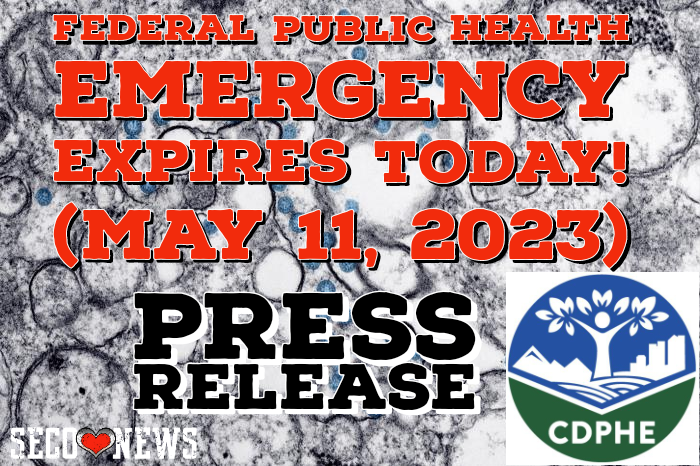State Prepared for Transition as Federal Public Health Emergency Expires on May 11, 2023

Description: Press Release from the Colorado Department of Public Health and Environment... (Image Background: First Covid-19 Case)

State Prepared for Transition as Federal Public Health Emergency Expires on May 11, 2023
STATEWIDE (May 10, 2023) — As announced in late January, the federal public health emergency declarations for COVID-19 will end on May 11. The State of Colorado has been planning for the end of the pandemic emergency for more than a year, authoring the Roadmap to Moving Forward as a way to navigate the changes. The Roadmap is the state’s plan for a sustainable, proportional, and continued response to COVID-19 that includes partnership between public and private entities to address the health care needs of all Coloradans.
Coloradans can continue to receive free COVID-19 vaccines at buses across the state through May 11. Everyone aged 6 months and older should get vaccinated. Federal funding for the vaccine buses and rapid response field teams will end on May 11, but Coloradans should continue to keep up to date on their vaccinations by visiting their primary care providers or one of hundreds of vaccine providers throughout the state, listed at covid19.colorado.gov/vaccinefinder.
Throughout the pandemic, the state prioritized removing barriers to vaccination, making sure that every Coloradan had access to free vaccines without having to show identification, insurance, or proof of medical history. As of May 2023, more than 4.8 million people in Colorado have gotten at least one dose of the life-saving COVID-19 vaccine and 4.2 million have gotten at least two doses. Colorado’s community vaccine sites and network of providers have administered more than 12.6 million cumulative doses of the vaccines, and mobile vaccine buses have made more than 6,000 stops throughout all 64 counties in the state.
● The COVID-19 vaccine is considered preventive care. Currently, COVID-19 vaccinations are covered under Medicare Part B without cost sharing, and this will continue. Private insurance plans and Health First Colorado (the state’s Medicaid program) and Child Health Plan Plus (CHP+), will also continue to cover the vaccine at no charge to enrolled members.
● Under the federal Vaccines for Children program, COVID-19 vaccines will continue to be available at no cost for children through 18 years of age who are uninsured, underinsured, on Medicaid or
Medicaid eligible, and/or Alaskan Native or American Indian. There are more than 570 provider offices, community health centers, and local public health agencies that currently participate in the Vaccines for Children program in Colorado.
● For adults without insurance, free COVID-19 vaccines will remain available at local pharmacies through the Department of Health and Human Services’s Bridge Access Program For COVID-19 Vaccines and Treatments.
● All COVID-19 vaccines provided under federal government purchase will remain available at no cost to Coloradans as long as supplies last.
● Colorado Senate Bill 23-260, Individual Access to Publicly Funded Vaccines, helps ensure Coloradans can get vaccinated regardless of whether they have health insurance, identification, or the ability to pay an administration fee. The bill prohibits providers from requiring Coloradans to show documentation to receive a publicly funded vaccine, and prohibits the vast majority of providers from requiring payment for publicly funded vaccines. Coloradans should also expect possible changes in the following areas if they get COVID-19 after the federal public health emergency ends on May 11.
COVID-19 medicine
● According to CDC, “medication to prevent severe COVID-19, such as Paxlovid, will remain available for free while supplies last.”
● After that, out-of-pocket expenses for certain treatments may change depending on a person’s health care coverage, similar to costs for other medicines. Health First Colorado (Colorado’s Medicaid program) will continue to cover COVID-19 treatments without out-of-pocket expenses.
● For people without insurance, certain COVID-19 medicines will remain available with no out-of-pocket costs at pharmacies participating in the Department of Health and Human Services’s Bridge Access Program For COVID-19 Vaccines and Treatments.
Testing
● Some local public health agencies continue to manage free community testing sites in their area, and some pharmacies provide low and no-cost COVID-19 testing through the federal Increasing Community Access to Testing program. Those locations can be found on CDPHE’s COVID-19 testing webpage and CDC’s Testing Locator, respectively.
● Federally funded free rapid tests will remain available at some statewide distribution sites after the end of the federal public health emergency for as long as supplies last.
● Medicare beneficiaries enrolled in Part B will continue to have coverage without cost sharing for laboratory-conducted COVID-19 tests when ordered by a provider, but access to federally funded, free over-the-counter COVID-19 tests will end. This is consistent with the statute on Medicare payment for tests set by Congress.
● While many insurers may choose to continue to cover COVID-19 testing, the federal requirement to cover it will end.
Long-term and residential care facilities
● Our commitment to ensuring the health and safety of one of our more at-risk populations is unchanged. Long-term and residential care facilities have long since been adept at monitoring — and mitigating — disease transmission, and they will continue that work. Testing continues to be required; it has always been a lynchpin of the work at these facilities, and facilities will continue to do all they can to protect their patients.
● Federally funded laboratory COVID-19 testing will no longer be available and certain waivers and flexibilities will end. The vast majority of testing at nursing homes is already funded through private insurers or Medicaid/Medicare. The state has provided a year's worth of rapid test kits to all long-term and residential care facilities. These tests have an extended shelf life of 22 months.
Public health emergency leave
● Four weeks after the state and federal public health emergencies end, employers will no longer be required to provide up to 80 hours of public health emergency leave. They will still need to provide accrued paid sick leave: one hour of paid leave per 30 hours worked, up to 48 hours per year.
Coloradans can use this accrued leave to recover from COVID-19 or to get a COVID-19 vaccine. Continue to stay up to date by visiting covid19.colorado.gov.
For Medicaid-specific information, please visit: https://hcpf.colorado.gov/covid-19-phe-planning.
Follow SECO News on Facebook.
Subscribe to the SECO News YouTube Channel.
Follow SECO News on Facebook.
Subscribe to the SECO News YouTube Channel.
Healthcare Sponsor




.png)


.png)




.png)



.png)


.png)







